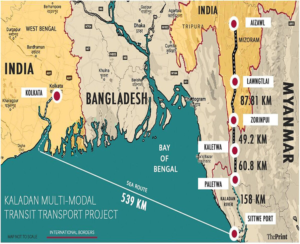In a recent operation, the Indian Armed Forces launched a missile strike on ULFA(I) hideouts in Myanmar in May 2025. The attack reportedly targeted high-ranking ULFA(I) leaders, resulting in the deaths of two top commanders. This strike is part of India’s ongoing efforts to tackle cross-border terrorism and prevent insurgent activities from spilling over into its territory.

| ULFA (United Liberation Front of Assam) ULFA is a separatist militant group founded in 1979 with the goal of establishing an independent Assam. It has been involved in insurgency and terrorist activities, seeking self-determination for the Assamese people. Key Points: * Objectives: Initially for independence, now seeking greater autonomy for Assam. *Violence: Involved in attacks on security forces, government institutions, and migrants. *Factions: Split into ULFA(I) (violent) and ULFA(PC) (engaged in peace talks). *Cross-border Operations: ULFA(I) operates from Myanmar and Bangladesh. *Government Action: India has carried out military operations, including a missile strike in Myanmar in May 2023, against ULFA(I) hideouts. Conclusion: ULFA, particularly ULFA(I), remains a significant insurgent group in northeast India, with ongoing cross-border terrorism challenges. |
Kaladan Multi-Modal Transit Transport Project (KMTTP)
The Kaladan Multi-Modal Transit Transport Project (KMTTP) is a key infrastructure initiative aimed at improving connectivity between India and Myanmar, while also boosting trade and transportation in the region.
Key Features:

- Objective: The project seeks to establish an alternative route connecting India’s northeast states to Myanmar and Southeast Asia, bypassing transport bottlenecks and difficult terrain.
- Components:
- Road Transport: Connecting Sittwe Port in Myanmar to Zokhawthar in Mizoram, India.
- River Transport: Utilizing the Kaladan River for goods movement in Myanmar.
- Sea Transport: Linking Sittwe Port to Indian ports, enabling sea-based trade.
Implementation:
- Phase 1: Construction of Sittwe Port in Myanmar and a road link to Zokhawthar.
- Phase 2: Enhancement of road infrastructure and river navigation to ensure smooth goods transport.
- The project is funded by India with Myanmar’s technical assistance.
Strategic Importance:
- The project enhances India’s access to Southeast Asia, improving regional trade and economic cooperation.
- It strengthens connectivity between India’s northeast and the Bay of Bengal, driving economic development.
- It also offers an alternative trade route with Myanmar, reducing reliance on current transport routes.
Conclusion:
The Kaladan Project plays a vital role in enhancing regional connectivity, fostering trade between India and Myanmar, and driving economic growth in India’s northeastern states. It aligns with India’s Act East Policy, strengthening ties with Southeast Asia.
